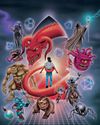
"SIENA: THE RISE OF PAINTING. 1300-1350" METROPOLITAN MUSEUM OF ART. THROUGH JANUARY 26.
WHAT A SIGHT it must have been. On June 9, 1311, Duccio di Buoninsegna's The Maestà was paraded from his studio to Siena's cathedral. Bells rang as priests, monks, noblemen, and government officials walked beside it. Citizens held candles in their hands. They were honoring a giant double-sided altarpiece with dozens of pictures depicting martyrs, saints, miracles, and poignant scenes from the lives of Mary and Jesus. At the center on one side was a life-size Virgin and Child, surrounded by 40 reverent haloed figures. A plaque attached to the work reads HOLY MOTHER OF GOD, BE THOU THE CAUSE OF PEACE FOR SIENA AND LIFE TO DUCCIO BECAUSE HE PAINTED THEE THUS.
The Maestà is part of the Metropolitan Museum of Art's rapturous "Siena: The Rise of Painting, 1300-1350," an opportunity to commune with art that will likely never be brought together again. Curator Stephan Wolohojian reunites works that have not been seen together in centuries; some have never traveled outside Italy. How this feat of lending was pulled off might fill a book. In the 18th century, Duccio's mighty altarpiece was sliced in half, cut into pieces, its panels sold off; now we can gape at the astonishing sight of ten panels of The Maestà from around the globe, eight of which are installed inches from one another. There are almost 100 works by at least 20 named artists. There are textiles, manuscripts, ivory carvings, stone sculptures, and one shocking wooden head of Christ split open during World War II.
This story is from the November 04-17, 2024 edition of New York magazine.
Start your 7-day Magzter GOLD free trial to access thousands of curated premium stories, and 9,000+ magazines and newspapers.
Already a subscriber ? Sign In
This story is from the November 04-17, 2024 edition of New York magazine.
Start your 7-day Magzter GOLD free trial to access thousands of curated premium stories, and 9,000+ magazines and newspapers.
Already a subscriber? Sign In

LIFE AS A MILLENNIAL STAGE MOM
A journey into the CUTTHROAT and ADORABLE world of professional CHILD ACTORS.

THE NEXT DRUG EPIDEMIC IS BLUE RASPBERRY FLAVORED
When the Amor brothers started selling tanks of flavored nitrous oxide at their chain of head shops, they didn't realize their brand would become synonymous with the country's burgeoning addiction to gas.

Two Texans in Williamsburg
David Nuss and Sarah Martin-Nuss tried to decorate their house on their own— until they realized they needed help: Like, how do we not just go to Pottery Barn?”

ADRIEN BRODY FOUND THE PART
The Brutalist is the best, most personal work he's done since The Pianist.

Art, Basil
Manuela is a farm-to-table gallery for hungry collectors.

'Sometimes a Single Word Is Enough to Open a Door'
How George C. Wolfein collaboration with Audra McDonald-subtly, indelibly reimagined musical theater's most domineering stage mother.

Rolling the Dice on Bird Flu
Denial, resilience, déjà vu.

The Most Dangerous Game
Fifty years on, Dungeons & Dragons has only grown more popular. But it continues to be misunderstood.

88 MINUTES WITH...Andy Kim
The new senator from New Jersey has vowed to shake up the political Establishment, a difficult task in Trump's Washington.

Apex Stomps In
The $44.6 million mega-Stegosaurus goes on view (for a while) at the American Museum of Natural History.